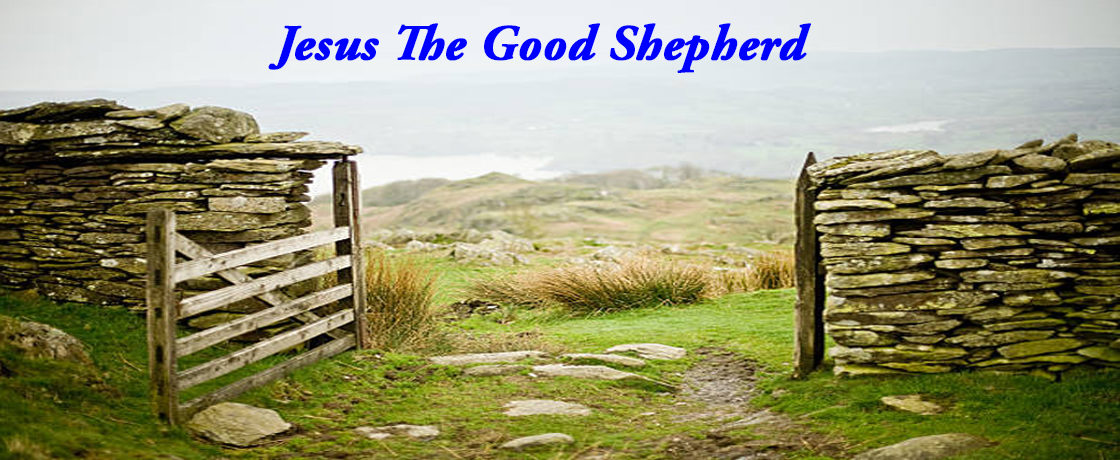Jesus The Good Shepherd
Jesus The Good Shepherd
Jesus is the good shepherd who lays down His life for the sheep. The hired watchman is not the same as the shepherd. When he sees the wolf coming, he abandons the sheep and runs away.
Thieves & Robbers
John 10:1 Verily, verily I say unto you, he that enters not by the door into the sheepfold, but climbs up some other way, the same is a thief and a robber.
The sheep in this metaphor is Judaism. But His own sheep, the remnant, the elect, or the messianic community within the sheep pen, He calls them by name, and they follow Him.
By contrast, thieves and robbers intend only to brutalize the sheep. The watchman would never let them in, so they climb in some unauthorized way. In the Old Testament, there are prophetic denunciations of the religious leaders of the day, using precisely the categories of sheep farming that we find here.
Isaiah 56:10-11 His watchmen are blind; they are all ignorant; they are all dumb dogs. 11 Yes, they are greedy dogs which can never have enough, and they are shepherds that cannot understand; they all look to their own way, every one for his gain, from his quarter.
They were and are religious leaders who are in the ministry only for themselves.
Jeremiah 23:1-2 “Woe be unto the pastors that destroy and scatter the sheep of My pasture!” says the LORD. 23:2 Therefore the LORD God of Israel speaks against the pastors that feed My people: “You have scattered My flock and driven them away.”
Ezekiel 34:2 Son of man, prophesy against the shepherds of Israel, prophesy and say unto them, “Thus says the Lord GOD unto the shepherds: ‘Woe be to the shepherds of Israel that feed themselves! Should not the shepherds feed the flocks?’ ”
Zechariah 1:8 Three shepherds also I cut off in one month; and my soul loathed them and their soul also abhorred me.
Zechariah 11:17 Woe to the worthless shepherd that leaves the flock! The sword shall be upon his arm and upon his right eye; his arm shall be clean dried up, and his right eye shall be utterly darkened.
Jesus the Good Shepherd Knows His Own People
John 10:2-3 But he that enters in by the door is the shepherd of the sheep. 10:3 To him the doorkeeper opens, and the sheep hear his voice; and he calls his own sheep by name, and leads them out.
The sheep are in a sheep pen. At night, several different families might keep their sheep together, guarded by a a hired person. In the morning, the sheep would know the call of their master and follow him and leave the pen.
The distinction Jesus especially drives home in this paragraph hinges on His own personal knowledge that the shepherd has of the sheep. Jesus is saying that He is the promised eschatological shepherd, and for those with ears to hear, He’s saying something even more: God Himself has promised to come. As the Good Shepherd, Jesus fleshes out the contrast between the Good Shepherd, and those who brutalize the sheep.
Jesus does not simply demand homage, like manipulators and religious gurus who control and direct, but do not actually know their people. Jesus knows us, in the truest sense that He loves and shepherds us as His own. He knows His people personally, as they know Him.
Jesus Nurtures His Own People
John 10:9 I am the door; by Me if any man enter in, he shall be saved, and shall go in and out, and find pasture. John 10:10b I am come that they might have life, and that they might have it more abundantly.
Here, the metaphor changes. Jesus is not the shepherd who goes through the gate; now, He is the gate. A shepherd would make a small enclosure in the wild at night if it was too far out to track the sheep back home.
He leads them out to find pasture, He leads them into the enclosure at night for safety, and leads them to food in the day. The point is that one who claims to be a shepherd, yet does not practically take care of the sheep, is a fraud.
Many religious leaders are no better. Even religious leaders within the confessing Christian church can savage the flock in multiple ways. One way is that they allow the worldly sins in the church with no word against it, and often even promote it. They are neither nurturing the flock nor protecting the flock.
Many televangelists who quite clearly have little gospel, but much fleecing of the sheep, have no interest in taking care of the people. They simply seek a donation, and praise. Many evangelistic appeals are based on the promise of abundant life, without clarifying what abundant life really is.
Within the metaphorical framework of sheep and shepherds, abundant means contentment, safe from oppression, complete, well nourished, trimmed, looked after, cared for, and secure.
Outside the metaphor, abundant does not mean they become greedy, selfish and materialistic.
In the context, it means they know the Shepherd, they know God, their spiritual life is flourishing.
They know personally this eternal God Who Cares.

